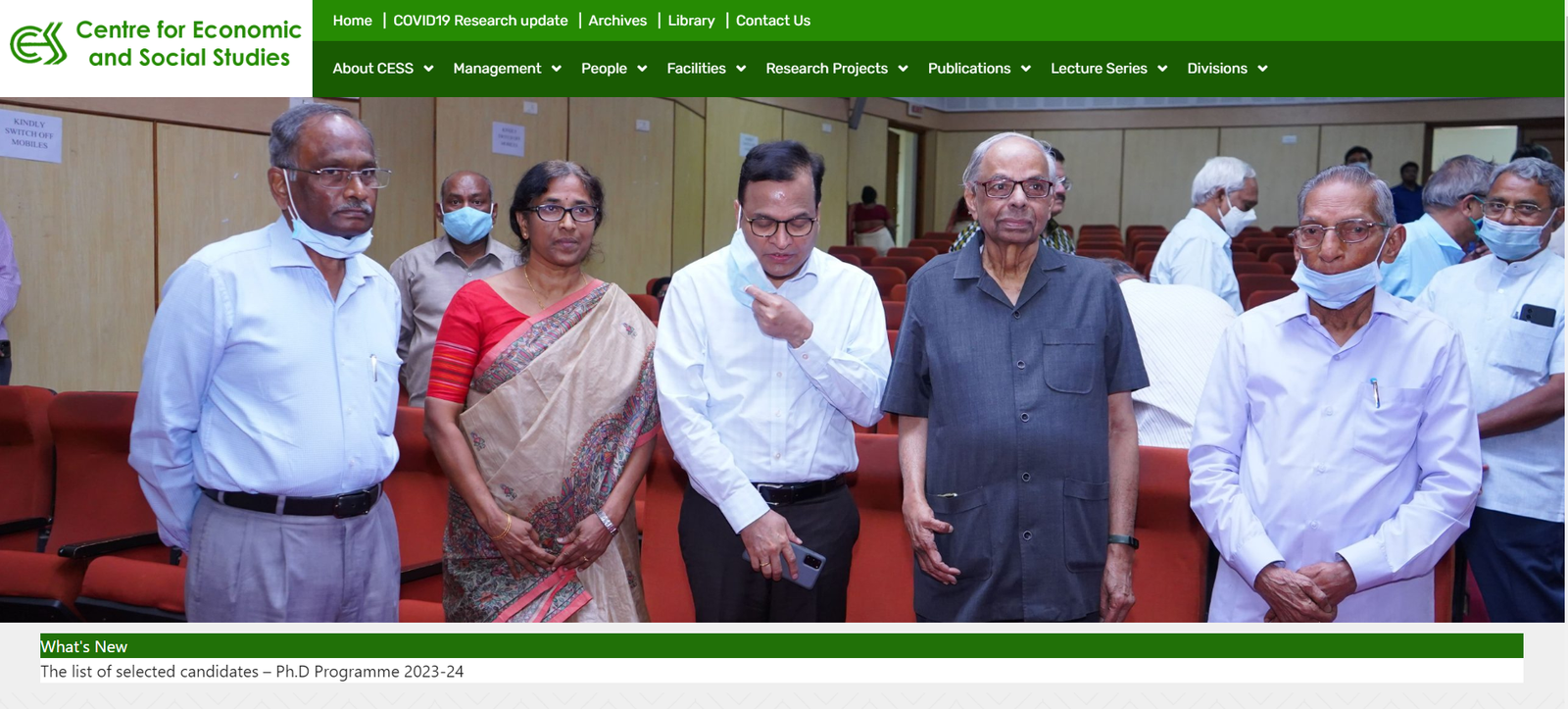Case Study: The Center for Economic and Social Studies University

- About the Customer
The Center for Economic and Social Studies University (CESS), a leading institution dedicated to research and education in economics and social sciences, embarked on a strategic initiative to migrate its WordPress website from IONOS hosting to Amazon Web Services (AWS) cloud infrastructure. The migration aimed to enhance website performance, scalability, and security while ensuring uninterrupted access to critical resources.
Project Name:
The Center for Economic and Social Studies University
Client:
CESS
Project Details:
Start Date: 15-12-2022 End Date: 03-01-2023
The Center for Economic and Social Studies University (CESS) embarked on a strategic initiative to enhance its online presence and digital infrastructure by migrating its WordPress website from IONOS hosting to Amazon Web Services (AWS) cloud infrastructure.
The migration aimed to address several key objectives:
- Performance and Reliability: The migration to AWS cloud infrastructure promises improved website performance, scalability, and reliability, ensuring seamless access to critical resources for students, faculty, and researchers.
- Security and Compliance: By leveraging AWS security features and best practices, CESS strengthens its security posture and safeguards sensitive data and intellectual property against potential threats and vulnerabilities.
- Scalability and Flexibility: AWS cloud infrastructure provides CESS with the scalability and flexibility to accommodate increasing traffic volumes and content requirements, supporting the institution’s growth and expansion initiatives.
- Streamlined Management: With centralized management and administration through AWS services, CESS benefits from streamlined website management, monitoring, and optimization, enabling efficient resource utilization and cost management.
The migration process encompasses comprehensive assessment, planning, and implementation steps, including infrastructure provisioning, data migration, WordPress configuration, DNS migration, SSL certificate setup, CloudFront integration, testing, and deployment.
The successful migration of the CESS WordPress website to AWS cloud infrastructure signifies a significant milestone in its digital transformation journey, positioning the institution to better serve its community and stakeholders with a robust, scalable, and secure online platform.
Looking ahead, CESS commits to continuous monitoring, optimization, and innovation, leveraging AWS services and emerging technologies to further enhance website capabilities, user experience, and organizational agility.
The Center for Economic and Social Studies University (CESS) may face several challenges that motivate its decision to migrate its WordPress website from IONOS to AWS cloud infrastructure. These challenges may include:
- Performance Limitations: The current hosting environment on IONOS may not offer optimal performance, leading to slow loading times, sluggish responsiveness, and poor user experience. This can negatively impact student engagement, faculty interaction, and overall website usability.
- Scalability Constraints: As CESS experiences fluctuations in website traffic, especially during peak academic periods or research activities, the current hosting solution may lack the scalability to accommodate sudden surges in user demand. This could result in website downtime, performance degradation, and potential disruptions to critical services.
- Security Concerns: With sensitive data, research findings, and academic resources hosted on the website, CESS must prioritize security to protect against cyber threats, data breaches, and unauthorized access. The current hosting environment may lack robust security features and compliance measures, posing risks to data integrity and confidentiality.
- Limited Flexibility and Control: The existing hosting platform may impose limitations on customization, configuration options, and administrative control, hindering CESS’s ability to tailor the website to its specific needs, integrate new features, and adapt to evolving requirements.
- Reliability and Uptime: CESS relies on its website as a primary channel for communication, collaboration, and information dissemination within its academic community. Any disruptions, downtime, or performance issues with the current hosting provider can undermine trust, credibility, and user satisfaction.
- Technical Support and Resources: In the event of technical issues, maintenance tasks, or troubleshooting requirements, CESS may encounter challenges in accessing timely and reliable support from the current hosting provider, leading to prolonged downtime and service interruptions.
- Cost Efficiency: While cost may not be the primary driver for migration, optimizing hosting expenses and resource utilization is a consideration for CESS. The current hosting solution may lack cost transparency, scalability options, or competitive pricing compared to cloud-based alternatives like AWS.
Addressing these challenges through migration to AWS cloud infrastructure enables CESS to overcome performance bottlenecks, enhance scalability, strengthen security measures, gain greater flexibility and control, improve reliability and uptime, access robust technical support, and optimize cost-effectiveness in the long run.
The solution offered to address the challenges faced by the Center for Economic and Social Studies University (CESS) involves migrating its WordPress website from IONOS hosting to Amazon Web Services (AWS) cloud infrastructure. The key components of the solution include:
Amazon EC2 for Hosting WordPress Application:
- Provisioning Amazon EC2 instances to host the WordPress application, providing scalable compute resources tailored to CESS’s specific requirements.
- Utilizing EC2’s flexibility and customization options to optimize performance, enhance reliability, and support high availability configurations.
Amazon RDS for MySQL Database Management:
- Deploying Amazon RDS instances to manage the MySQL database backend of the WordPress website, offering a fully managed, scalable, and reliable database solution.
- Leveraging RDS’s automated backups, monitoring capabilities, and security features to ensure data integrity, availability, and compliance.
Amazon CloudFront for Content Delivery Network (CDN) Acceleration:
- Configuring Amazon CloudFront distributions to accelerate content delivery, improve website performance, and enhance user experience through reduced latency and increased throughput.
- Leveraging CloudFront edge locations to cache static and dynamic content, serving content from the nearest edge location to users worldwide.
Amazon Route 53 for DNS Management:
- Leveraging Amazon Route 53’s scalable and highly available DNS management service to route traffic to CESS’s AWS resources efficiently.
- Utilizing Route 53’s advanced routing policies, health checks, and failover capabilities to optimize website availability, resilience, and fault tolerance.
AWS Identity and Access Management (IAM) for Security and Access Control:
- Implementing AWS IAM to manage user access, permissions, and authentication for CESS’s AWS resources and services.
- Enforcing least privilege principles, multi-factor authentication (MFA), and role-based access controls (RBAC) to mitigate security risks and protect against unauthorized access.
AWS Certificate Manager for SSL Certificate Provisioning:
- Leveraging AWS Certificate Manager to provision, manage, and deploy SSL/TLS certificates for securing HTTPS connections to the WordPress website.
- Automating certificate issuance, renewal, and deployment processes to simplify SSL certificate management and ensure compliance with security best practices.
By migrating to AWS cloud infrastructure and leveraging these AWS services, CESS can address its current challenges effectively, including performance limitations, scalability constraints, security concerns, limited flexibility and control, reliability and uptime issues, and cost efficiency considerations. The solution enables CESS to enhance website performance, reliability, scalability, security, and cost-effectiveness while gaining greater control, flexibility, and agility in managing its online presence and digital assets.
- Amazon Web Services Infrastructural Services Used:

Amazon EC2 (Elastic Compute Cloud)

Amazon Route 53

AWS Identity and Access Management (IAM)
- Benefits
Improved Performance
By leveraging AWS services like Amazon EC2 and CloudFront, CESS's website experiences enhanced performance and responsiveness. CloudFront's content delivery network accelerates content delivery by caching data at edge locations, reducing latency and improving user experience.
Enhanced Scalability
AWS infrastructure offers scalable compute and database resources through services like EC2 and RDS. This allows CESS to easily handle fluctuating traffic volumes, ensuring that the website remains responsive and available even during peak usage periods.
Increased Security
With AWS IAM, CESS can implement robust security measures, including granular access controls, multi-factor authentication (MFA), and encryption of data in transit and at rest. ACM ensures that SSL/TLS certificates are managed securely, protecting sensitive user data and maintaining trust.
Greater Reliability and Availability
AWS's highly redundant infrastructure and global network infrastructure ensure high availability and reliability for CESS's website. Route 53's DNS management capabilities enable efficient traffic routing and failover, minimizing downtime and ensuring continuous accessibility.
Streamlined Management and Administration
With AWS's centralized management console and automation capabilities, CESS gains greater visibility and control over its website infrastructure. Automated backups, scaling policies, and monitoring tools simplify management tasks and reduce operational overhead.
Cost Efficiency
AWS's pay-as-you-go pricing model allows CESS to optimize costs by paying only for the resources consumed. Additionally, AWS's elasticity enables CESS to scale resources up or down based on demand, avoiding over-provisioning and unnecessary expenses.
Scalability and Flexibility
AWS provides a wide range of services and features that enable CESS to adapt to evolving requirements and technology trends. The flexibility of AWS infrastructure allows CESS to innovate and deploy new features or services quickly and efficiently.
About the Customer
Executive Summary
- Performance and Reliability: The migration to AWS cloud infrastructure promises improved website performance, scalability, and reliability, ensuring seamless access to critical resources for students, faculty, and researchers.
- Security and Compliance: By leveraging AWS security features and best practices, CESS strengthens its security posture and safeguards sensitive data and intellectual property against potential threats and vulnerabilities.
- Scalability and Flexibility: AWS cloud infrastructure provides CESS with the scalability and flexibility to accommodate increasing traffic volumes and content requirements, supporting the institution’s growth and expansion initiatives.
- Streamlined Management: With centralized management and administration through AWS services, CESS benefits from streamlined website management, monitoring, and optimization, enabling efficient resource utilization and cost management.
Current Challenges by the Customer
The Solution Offered
Amazon Web Services Infrastructural Services Used:
- Amazon EC2 (Elastic Compute Cloud)
- Amazon RDS (Relational Database Service)
- Amazon CloudFront
- Amazon Route 53
- AWS Identity and Access Management (IAM)
- AWS Certificate Manager (ACM)
Benefits
Migrating the Center for Economic and Social Studies University (CESS)’s WordPress website from IONOS to AWS cloud infrastructure yields several key benefits:
Improved Performance: By leveraging AWS services like Amazon EC2 and CloudFront, CESS’s website experiences enhanced performance and responsiveness. CloudFront’s content delivery network accelerates content delivery by caching data at edge locations, reducing latency and improving user experience.
Enhanced Scalability: AWS infrastructure offers scalable compute and database resources through services like EC2 and RDS. This allows CESS to easily handle fluctuating traffic volumes, ensuring that the website remains responsive and available even during peak usage periods.
Increased Security: With AWS IAM, CESS can implement robust security measures, including granular access controls, multi-factor authentication (MFA), and encryption of data in transit and at rest. ACM ensures that SSL/TLS certificates are managed securely, protecting sensitive user data and maintaining trust.
Greater Reliability and Availability: AWS’s highly redundant infrastructure and global network infrastructure ensure high availability and reliability for CESS’s website. Route 53’s DNS management capabilities enable efficient traffic routing and failover, minimizing downtime and ensuring continuous accessibility.
Streamlined Management and Administration: With AWS’s centralized management console and automation capabilities, CESS gains greater visibility and control over its website infrastructure. Automated backups, scaling policies, and monitoring tools simplify management tasks and reduce operational overhead.
Cost Efficiency: AWS’s pay-as-you-go pricing model allows CESS to optimize costs by paying only for the resources consumed. Additionally, AWS’s elasticity enables CESS to scale resources up or down based on demand, avoiding over-provisioning and unnecessary expenses.
Scalability and Flexibility: AWS provides a wide range of services and features that enable CESS to adapt to evolving requirements and technology trends. The flexibility of AWS infrastructure allows CESS to innovate and deploy new features or services quickly and efficiently.
Overall, migrating CESS’s WordPress website to AWS cloud infrastructure enables the institution to deliver a superior online experience to its students, faculty, and researchers while achieving greater agility, security, and cost-effectiveness in managing its digital assets.
Project Start Date: 15-12-2022
Project End Date: 03-01-2023
- Executive Summary
The Center for Economic and Social Studies University (CESS) embarked on a strategic initiative to enhance its online presence and digital infrastructure by migrating its WordPress website from IONOS hosting to Amazon Web Services (AWS) cloud infrastructure.
The migration aimed to address several key objectives:
The migration to AWS cloud infrastructure promises improved website performance, scalability, and reliability, ensuring seamless access to critical resources for students, faculty, and researchers.
By leveraging AWS security features and best practices, CESS strengthens its security posture and safeguards sensitive data and intellectual property against potential threats and vulnerabilities.
AWS cloud infrastructure provides CESS with the scalability and flexibility to accommodate increasing traffic volumes and content requirements, supporting the institution’s growth and expansion initiatives.
With centralized management and administration through AWS services, CESS benefits from streamlined website management, monitoring, and optimization, enabling efficient resource utilization and cost management.
The migration process encompasses comprehensive assessment, planning, and implementation steps, including infrastructure provisioning, data migration, WordPress configuration, DNS migration, testing, and deployment.
The successful migration of the CESS WordPress website to AWS cloud infrastructure signifies a significant milestone in its digital transformation journey, positioning the institution to better serve its community and stakeholders with a robust, scalable, and secure online platform.
Looking ahead, CESS commits to continuous monitoring, optimization, and innovation, leveraging AWS services and emerging technologies to further enhance website capabilities, user experience, and organizational agility.
- Current Challenges By The Customer
The Center for Economic and Social Studies University (CESS) may face several challenges that motivate its decision to migrate its WordPress website from IONOS to AWS cloud infrastructure. These challenges may include:
The current hosting environment on IONOS may not offer optimal performance, leading to slow loading times, sluggish responsiveness, and poor user experience. This can negatively impact student engagement, faculty interaction, and overall website usability.
As CESS experiences fluctuations in website traffic, especially during peak academic periods or research activities, the current hosting solution may lack the scalability to accommodate sudden surges in user demand. This could result in website downtime, performance degradation, and potential disruptions to critical services.
With sensitive data, research findings, and academic resources hosted on the website, CESS must prioritize security to protect against cyber threats, data breaches, and unauthorized access. The current hosting environment may lack robust security features and compliance measures, posing risks to data integrity and confidentiality.
The existing hosting platform may impose limitations on customization, configuration options, and administrative control, hindering CESS’s ability to tailor the website to its specific needs, integrate new features, and adapt to evolving requirements.
CESS relies on its website as a primary channel for communication, collaboration, and information dissemination within its academic community. Any disruptions, downtime, or performance issues with the current hosting provider can undermine trust, credibility, and user satisfaction.
In the event of technical issues, maintenance tasks, or troubleshooting requirements, CESS may encounter challenges in accessing timely and reliable support from the current hosting provider, leading to prolonged downtime and service interruptions.
While cost may not be the primary driver for migration, optimizing hosting expenses and resource utilization is a consideration for CESS. The current hosting solution may lack cost transparency, scalability options, or competitive pricing compared to cloud-based alternatives like AWS.
Addressing these challenges through migration to AWS cloud infrastructure enables CESS to overcome performance bottlenecks, enhance scalability, strengthen security measures, gain greater flexibility and control, improve reliability and uptime, access robust technical support, and optimize cost-effectiveness in the long run.